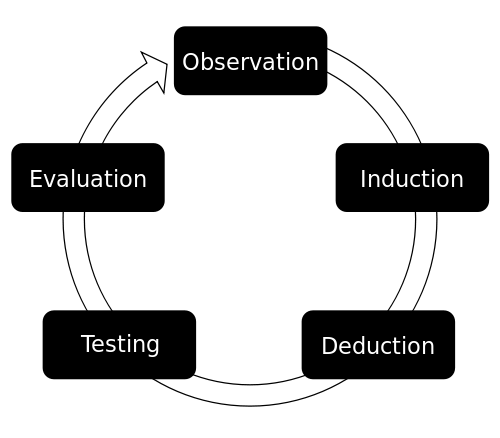When empirical data hits your bull's eye
[...]Terminology
The term empirical was originally used to refer to certain ancient Greek practitioners of medicine who rejected adherence to the dogmatic doctrines of the day, preferring instead to rely on the observation of phenomena as perceived in experience. Later empiricism referred to a theory of knowledge in philosophy which adheres to the principle that knowledge arises from experience and evidence gathered specifically using the senses. In scientific use the term empirical refers to the gathering of data using only evidence that is observable by the senses or in some cases using calibrated scientific instruments. What early philosophers described as empiricist and empirical research have in common is the dependence on observable data to formulate and test theories and come to conclusions.[...]
[...]Scientific research
Accurate analysis of data using standardized statistical methods in scientific studies is critical to determining the validity of empirical research. Statistical formulas such as regression, uncertainty coefficient, t-test, chi square, and various types of ANOVA (analyses of variance) are fundamental to forming logical, valid conclusions. If empirical data reach significance under the appropriate statistical formula, the research hypothesis is supported. If not, the null hypothesis is supported (or, more correctly, not rejected), meaning no effect of the independent variable(s) was observed on the dependent variable(s).
It is important to understand that the outcome of empirical research using statistical hypothesis testing is never proof. It can only support a hypothesis, reject it, or do neither. These methods yield only probabilities.
Among scientific researchers, empirical evidence (as distinct from empirical research) refers to objective evidence that appears the same regardless of the observer. For example, a thermometer will not display different temperatures for each individual who observes it. Temperature, as measured by an accurate, well calibrated thermometer, is empirical evidence. By contrast, non-empirical evidence is subjective, depending on the observer. Following the previous example, observer A might truthfully report that a room is warm, while observer B might truthfully report that the same room is cool, though both observe the same reading on the thermometer. The use of empirical evidence negates this effect of personal (i.e., subjective) experience.
Ideally, empirical research yields empirical evidence, which can then be analyzed for statistical significance or reported in its raw form.[...]





0 Comments:
Post a Comment
Subscribe to Post Comments [Atom]
<< Home